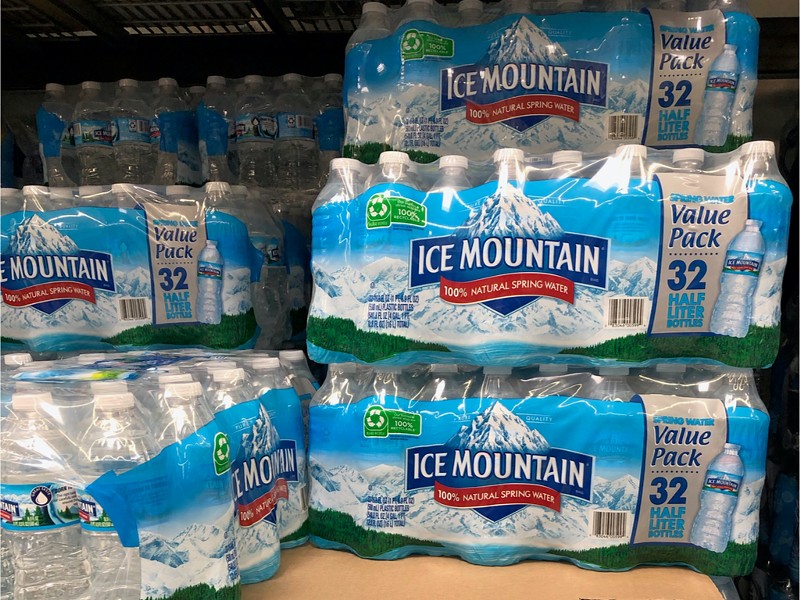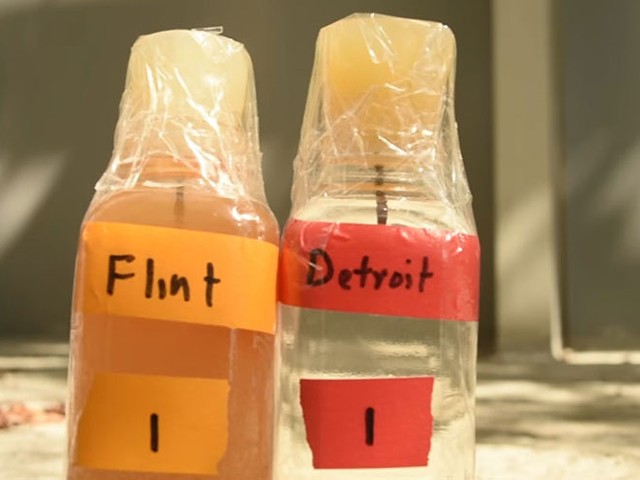You have to hand it to the MDEQ, the Michigan Department of Environmental Quality — the most gloriously misnamed agency since the Ministry of Truth in George Orwell's 1984.
It's not just that under Rick Snyder, the governor whose emergency manager minions poisoned an entire city, the MDEQ has repeatedly proven that they couldn't care less about the environment.
No, it's that they not only don't care what we think, they no longer even feel bound to pretend that they do. We all pretty much know about Flint, though my favorite part of that story is this: Soon after Snyder's emergency managers switched Flint over to the filthy, corroded Flint River water, General Motors announced they could no longer use the water in its engine factory there.
Seems it was corroding the engine parts. (To save a few bucks, the emergency managers didn't bother to add anti-corrosive solution to the water, which is why it caused lead to leach out of old pipes and into children's bodies.) This was in October 2014.
Did that set off alarm bells in the MDEQ over what this water might be doing to, uh, human beings? Not at all. In fact, then-director Dan Wyant and his trusty PR yapdog Brad Wurfel later ridiculed reporters and citizens who suspected there was something wrong.
Those two were finally fired, more than a year later. But the MDEQ has not changed its ways. The next year, Keith Butler, a pastor with his mind on the quick buck, wanted to allow drilling for oil and gas on his Word of Faith church site in densely populated suburban Southfield. Mayor Ken Siver was horrified.
So was the council. Southfield has around 75,000 people, and many who live in the area of the church (the former Duns Scotus) rely on easily contaminated well water.
MDEQ held a hearing at Southfield High School, in which many angry residents expressed their clear opposition to allowing drilling on the site. But the department granted the permit anyway. (Happily, they found nothing worth selling, and soon gave up.)
Even more outrageous was what happened at the beginning of this month. Nobody disputes that Michigan's most precious resource is our Great Lakes, which hold the vast majority of this hemisphere's supply of fresh water. Their ecology is a fragile thing.
But where there's a corporate buck to be made, the MDEQ doesn't give a damn. Nestlé, an international conglomerate based in Switzerland, was already pumping water out of White Pine Springs in Osceola County, and wanted to take much more — up to 576,000 gallons per day to bottle and cell under its Ice Mountain label.
The residents were horrified, as were state environmentalists. MDEQ invited public comment — and they got it, all right.
According to MDEQ, there were 75 people who were in favor of Nestlé draining the water table — and 80,945 citizens vehemently opposed. That works out to more than 99.9 percent against it!
Not even my old pal, the Stalinist Albanian dictator Enver Hoxha, ever got that emphatic a result. Indeed, I have never seen any issue that got close to such unanimous support.
Nevertheless, Nestlé got the permit anyway, in an open show of utter contempt for Michigan's citizens. Hard to believe, but eight years ago some expected Snyder to be a pro-environment governor.
Environmentalists and those in the legislature who do care about our resources were livid. "This should never have been up for debate," said State Sen. Rebekah Warren, an Ann Arbor Democrat. "The DEQ's own Water Withdrawal Assessment Tool computer model showed that this permit will threaten the health of nearby rivers and streams."
This was a case of "putting profits before people," a phrase that might be an ideal title for a book about Rick Snyder.
"This reckless decision will be felt for generations, with negative impacts on Michigan's lakes, rivers and streams," Lisa Wozniak, executive director of the League of Conservation Voters, said.
Well, of course it will.
But why would you expect anyone in this administration to care? After Snyder was pretty much forced to fire Wyant, he appointed Heidi Grether head of the agency. Her last big job was to be a lobbyist for BP America during their 2010 Deepwater Horizon disaster, which was the largest marine oil spill in history.
When asked about approving this, MDEQ employees tended to sound like Germans on trial in Nuremberg: The Nazis tended to say, "We were just following orders." Here, modern DEQ bureaucrats tend to claim they were just following the law.
"We can't, we don't have the power to say no arbitrarily," one Matt Gamble, a water supervisor, said. Well, guess what, Matt: Many people don't agree. And in any case, Nazi Germany had all sorts of laws too, many of which made acts of human compassion illegal.
There were a brave few who broke their laws. There is absolutely no excuse for pampering developers to risk our public safety. Except, as Michael Jackman has noted in the pages of Metro Times, under Rick Snyder, one of MDEQ's "guiding principles" is to be "partners in economic development" with those who they regulate.
How's that working out for us? What's baffling is that some candidate for governor hasn't yet seized on this as an issue, and promised us an MDEQ which puts humans first.
Yes, excuse me... did you say something, Mr. Schuette?
Two cheers for Gretchen Whitmer: I've been critical of the likely Democratic nominee on a number of occasions for not taking strong stands on the issues.
But earlier this month, she unveiled a "Get it Done: Rebuild Michigan," infrastructure plan, one that actually would have some chance at becoming reality. She proposes to ask the legislature to come up with $3 billion to address, not just the roads, but various other parts of our state that are crumbling, including water systems; she would also address the need to expand broadband internet access.
Her plan would also modernize electrical systems and help build a badly needed new Soo lock. Naturally, our dysfunctional legislature is unlikely to do anything about this.
Republicans would mostly rather die than raise taxes. But if that doesn't work, she would float a bond issue and let the people invest in saving themselves by building a future.
Her plan, as she points out, would save us money by costing us money. One example: Our merdeuse roads cost the average metropolitan Detroit driver an extra $865 a year in wear and tear alone, "but that money doesn't go to fixing a single pothole."
Three billion is, alas, way too little to get even the roads properly fixed. But it is a start. To be fair, she isn't the first candidate to talk about infrastructure. Bill Cobbs, probably the least known candidate for the Democratic nomination, proposed a $60 billion infrastructure replacement initiative.
That's a great idea, but it is hard to fathom how we would realistically talk voters into paying such a staggering fee.
A spokesperson for Abdul El-Sayed told me he wants to set aside $105 million for infrastructure in his first budget, an amount entirely too small; his campaign also didn't appear to know that the "state infrastructure bank" he wants to establish already exists. (A campaign spokesman for El-Sayed says the $105 million refers specifically to a clean energy bank proposal and not infrastructure as a whole, and says a more comprehensive infrastructure plan, as well as plans for the bank, is expected to be rolled out in the coming weeks.)
In any event, it is good that these candidates are at least pledging to get new money to repair our infrastructure. Yes, we are all going to have to pay more in taxes, if we want to survive.
So if that mortally offends you, well, die. Otherwise, get over it.






